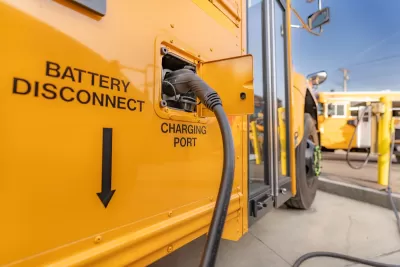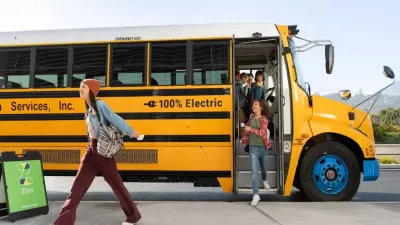Why switching school bus fleets to electric vehicles is good for students, the environment, and school districts’ finances.

In an opinion piece, former chair of the Republican National Committee Michael Steele calls for support of electrifying school bus fleets despite “claims by some in Congress that federal government support for electric school buses is a ploy to help the Chinese Communist Party (CCP).”
According to Steele, “Unsubstantiated claims about e-buses somehow helping the CCP distract from the clear advantages of modernizing our school bus infrastructure and only serve as political theater for some lawmakers to energize a certain segment of their base.”
Steele notes that his home state of Maryland is one of the nation’s leaders in buying electric school buses, with Montgomery County already operating a fleet of over 220 electric school buses.
Steele highlights the benefits of electrifying school fleets: improved health for students, reduced greenhouse gas emissions, and economic advantages. “One study found that electric buses could save between $73,000 and $173,000 per unit over their lifetimes. A Department of Energy study similarly projected hundreds of thousands of dollars’ in savings for a city that invested in four electric buses and four charging stations.”
For Steele, the health and environmental benefits are obvious and unimpeachable, while the up-front costs are offset by future savings. “An ounce of prevention is worth a pound of cure, and this one will yield us lower costs, cleaner communities and healthier kids.”
FULL STORY: Don’t Pump the Brakes on Electric School Buses

Planetizen Federal Action Tracker
A weekly monitor of how Trump’s orders and actions are impacting planners and planning in America.

Maui's Vacation Rental Debate Turns Ugly
Verbal attacks, misinformation campaigns and fistfights plague a high-stakes debate to convert thousands of vacation rentals into long-term housing.

San Francisco Suspends Traffic Calming Amidst Record Deaths
Citing “a challenging fiscal landscape,” the city will cease the program on the heels of 42 traffic deaths, including 24 pedestrians.

Defunct Pittsburgh Power Plant to Become Residential Tower
A decommissioned steam heat plant will be redeveloped into almost 100 affordable housing units.

Trump Prompts Restructuring of Transportation Research Board in “Unprecedented Overreach”
The TRB has eliminated more than half of its committees including those focused on climate, equity, and cities.

Amtrak Rolls Out New Orleans to Alabama “Mardi Gras” Train
The new service will operate morning and evening departures between Mobile and New Orleans.
Urban Design for Planners 1: Software Tools
This six-course series explores essential urban design concepts using open source software and equips planners with the tools they need to participate fully in the urban design process.
Planning for Universal Design
Learn the tools for implementing Universal Design in planning regulations.
Heyer Gruel & Associates PA
JM Goldson LLC
Custer County Colorado
City of Camden Redevelopment Agency
City of Astoria
Transportation Research & Education Center (TREC) at Portland State University
Jefferson Parish Government
Camden Redevelopment Agency
City of Claremont





























